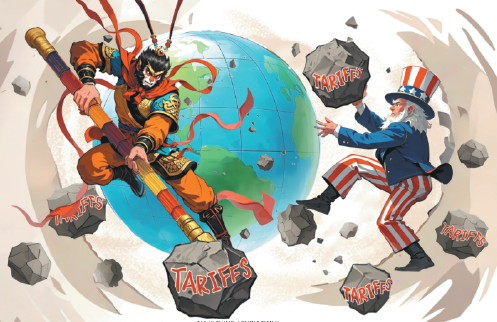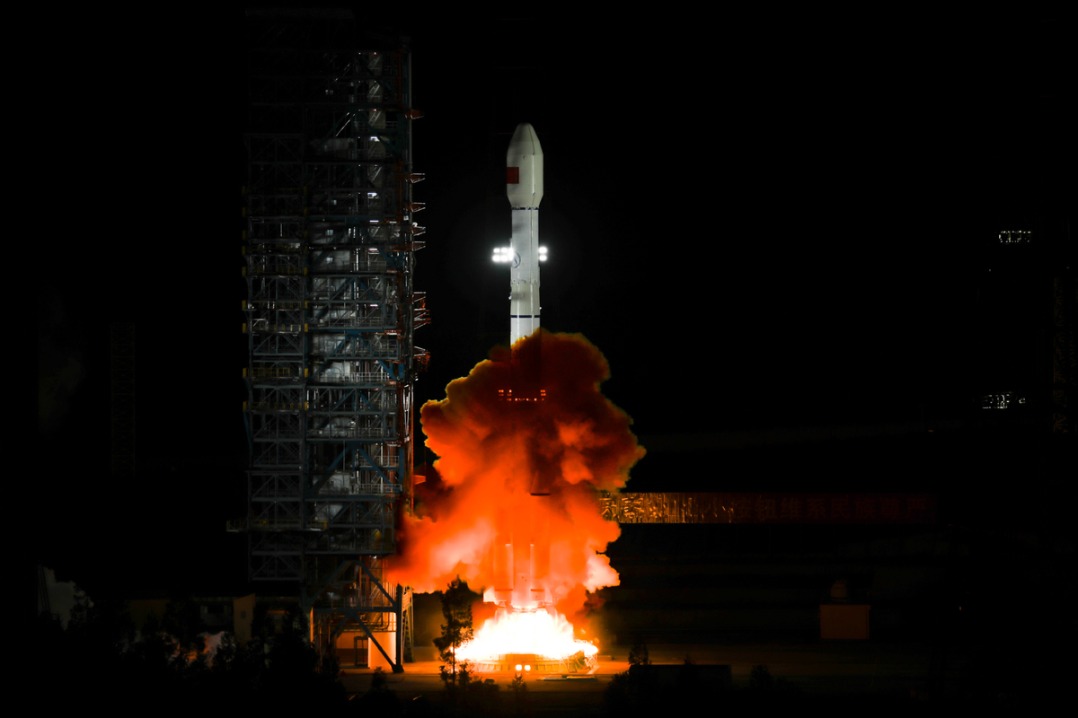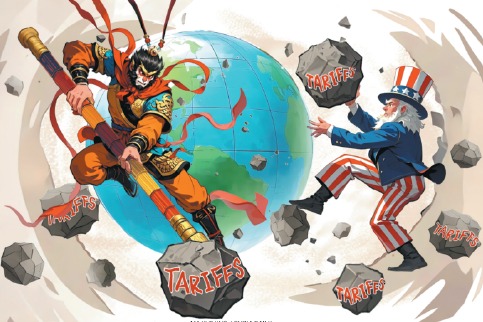Pull together, and the world will emerge from the tariff war


An unprecedented tariff war is unfolding across the world.
In fact, China was already in this battle seven years ago. But things are different now: from the United States versus China, the battle has become the United States versus the whole world.
The US doesn't represent the whole world
The population of the US only accounts for four percent of the world's total, and its GDP is less than 30 percent. Adjusted by purchasing power parity, the number lowers to less than 16 percent.
In 2024, the US share in global trade was under 17 percent, with trade dependence of various countries on the US decreasing. China's exports to the US account for just two percent of its total economic output. The proportion of trade with the US by key economies such as ASEAN and the EU is also declining.
More and more people around the world are losing confidence in the US and starting to believe that de-risking means de-Americanization. Recently, President of the European Commission Ursula von der Leyen said the EU will focus like a laser beam on the 83 percent of global trade that is beyond the United States. Professor Jeffrey Sachs of Columbia University said if the US is stupid enough to block trade with the rest of the world, China will be smart enough to open trade widely with the rest of the world.
The US is the biggest beneficiary of a globalized economy
Some American politicians claim that America is "exploited" in international trade. But the truth is, the US has never been a victim. It is the biggest beneficiary of a globalized economy.
Economic globalization is an essential requirement for the development of productive forces and an inevitable result of scientific and technological progress. From as small as a pencil to as large as an airplane, most merchandise are products of the global manufacturing ecosystem. Otherwise, how can we achieve the goal of high quality with low price?
Now, some American politicians are trying to artificially sever this efficient trade system. In essence, it is an attempt to deprive the people of the world, including Americans, of the right to make free choices.
The root cause of the American trade deficit lies in its excessive budget deficit. The US Treasury securities have already exceeded 36 trillion dollars, ranking first in the world, which is equivalent to each American owing $100,000.
The sky won't fall
More than 70 years ago, China was a country with non-existent industrial foundation. Now, it has become the only country that has all 41 industries across all categories listed by the UN.
The scale of China's manufacturing sector ranks first in the world. The UN predicts that by 2030, China's total industrial output value will be four times that of the US.
Chinese people are not afraid of being "held by the throat". Where the suppression is the most intense, the resilience and rebound will be the strongest.
The huge domestic consumer market is a key source of confidence for China. In 2024, nearly 85 percent of Chinese exporters engaged in domestic sales at the same time, and the amount of domestic sales accounted for about 75 percent of their total business.
More importantly, China is not alone. It is the main trading partner of over 150 countries and regions. The proportion of China's exports to ASEAN in its total trade mix is on the rise, and the share of exports to countries participating in the Belt and Road Initiative is also growing rapidly. In Latin America, the model of "Chinese standards+RMB settlement" enables Brazilian soy beans and Chilean copper ore to reach the Chinese market directly through land-sea transportation.
The domestic economic circulation stabilizes the market, and the international circulation expands new space. China's confidence stems from this dual-wheel driving. The market is global and cooperation is multilateral. No one can stop China from developing.
The US is increasing tariffs on China while showing "leniency" to other countries. Its malicious intention of "bullying the world and encircling China" is crystal clear.
Mao Zedong said in 1964, "The US intimidates certain countries, stopping them from doing business with us. But America is just a paper tiger. Don't believe its bluff. One poke, and it'll burst!"
The Chinese people will not succumb to maximum pressure. When they say "our response will continue to the end", they mean it.
The trade war hinges on public support
The China-US game is a competition of public sentiments. The key lies in who can withstand more pressure and who is more united.
Chinese people have fully understood that yielding will never lead to victory. At this crucial moment, more than 1.4 billion Chinese people are taking practical actions. Enterprises repurchased shares to stabilize confidence. Netizens flooded the screen with comments like "Don't be afraid. Unite in the fight!"
These do not come from orders or mobilization but from patriotism. When more than 1.4 billion Chinese people are united as one, they will form an impregnable Great Wall.
In the US, on the contrary, pensions are shrinking, and hundreds of thousands of people are taking to the streets. Piles of unsold auto parts at the Port of Los Angeles are pushing autoworkers to the brink of a strike.
The Yale Budget Lab predicts that reciprocal tariffs will cost each American household US$3,800, drive up prices by 2.3 percent, and reduce exports by 18 percent. Goldman Sachs, JPMorgan Chase and other institutions have raised the probability of a US economic recession to 45-60 percent. The American public, businesses and investors will soon suffer more losses.
Mao Zedong said during the Korean War in 1953, "As to how long this war will last, we are not the ones who can decide. It used to depend on President Truman, and it will depend on President Eisenhower or whoever to become the next US president. It's up to them. No matter how long this war is going to last, we'll never yield. We'll fight until we completely triumph."
Pull together, and the tariff war will end!
The author is a commentator on international affairs, writing regularly for Xinhua News, CGTN, Global Times, China Daily. The views don't necessarily reflect those of China Daily.
If you have a specific expertise, or would like to share your thought about our stories, then send us your writings at [email protected], and [email protected].
































